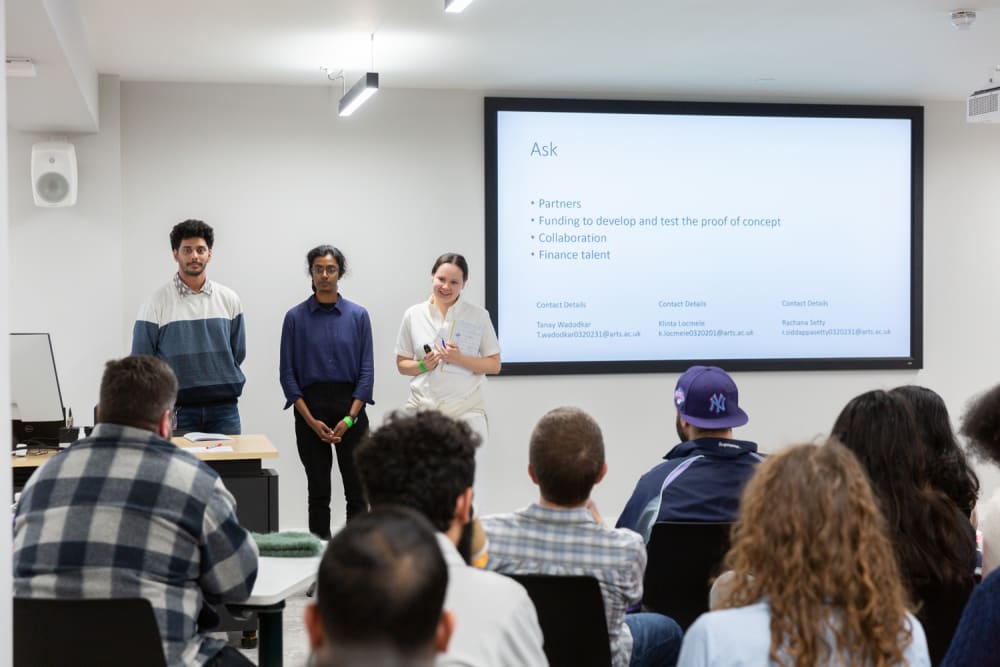
LCC Accelerate 2024 Round-Up: Accessify, AllKin, CERA and GoGX
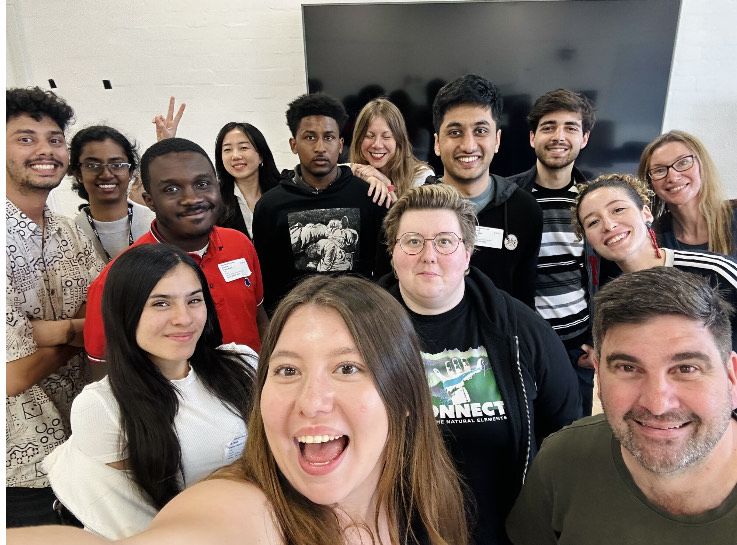
- Written byHenry Smith
- Published date 18 October 2024

Championing new talent from all creative disciplines, the 2024 edition of the LCC Accelerate programme at London College of Communication (LCC) helped graduates to become entrepreneurs, building their careers beyond life at the College. Business ideas spanned accessible living, podcasting and products built out of sustainable materials – shaping the world of the future with fresh ideas.
Taking place over the course of 12 weeks, the LCC Accelerate allows former LCC students who have graduated in the past 3 years to test out their business ideas. They network with like-minded professionals to develop their own professional mindsets, primed to thrive in a real-world context.
Participants in the LCC Accelerate programme learn how to complement their creative thinking with business acumen, collaborating with experienced professionals and expert advisers to better understand the practical and financial aspects of their initial concepts.
They also learn how to market their unique brand, build networks and pitch to potential investors, as well as deepening their understanding of real-world issues to make a lasting impact.
For this year’s edition of the programme, LCC Accelerate saw the growth and nurturing of 14 businesses by LCC graduates.
We spoke to 4 of these businesses founders to learn more about their experiences of the Accelerate program:
- Hayley Jones created GoGX, a business built around creating workshops designed to help older people to embrace social media and technology.
- AllKin by Eleanor Swann is an accessible sensory brand that can supply attire and resources that can change the day-to-day experience of users and their families.
- MA Design Management grad Rachana Setty collaborated with UAL students Klinta Locmele and Tanay Wadodkar to establish CERA, a ceramic air filter that aims to tackle the issue of unclean air in Underground stations – improving the wellbeing of city-dwellers who are exposed to large quantities of air pollution.
- Abi Chapman founded Accessify, an accessible living think tank that aims to connect researchers, creatives, medical health-care practitioners and people of lived experience to improve quality of life and community health. Accessify recently won Community Service Provider of the Year at Tandridge Business Awards run by Surrey County Council.
Expert testimonials
Andrew Tollinton, co-founder of SIRV (a business that applies AI to risk management) delivered a session for our Accelerate grads on pitching their business ideas effectively. Of this year’s crop of creative business owners, he said: “It's terrific fun to exchange ideas and generate solutions to problems with so many great creative entrepreneurs, full of excitement and possibilities. The opportunity to help shape an entrepreneur's journey is an honour and truly energising.”
Patrick Morris, Founder of Carbon Forest Products, who mentored CERA and helped them pitch Transport for London (TfL) on a possible application for their air filter, had this to say:
“The CERA team impressed me with the simplicity of their original concept. As we have worked together over the past 6 months and started to engage with potential end users, they have further impressed me with their willingness to pivot, adapt, and develop their thinking and vision in order to nurture their project into life beyond the studio.”
Samina Kiyani gave 2 talks and worked with the Accelerate graduates to help them understand their customers and create better products for them. She had this to say of the Accelerate 2024 entrepreneurs:
“As an entrepreneur and media and communications professional who has had the privilege of working with LCC Accelerate, I can vouch for the programme’s invaluable impact on emerging creative talent. The founders I have encountered through this initiative consistently demonstrate remarkable passion, innovation, and drive.”
To learn more about Accelerate 2024, we spoke to Abi, Eleanor, Hayley and the team behind CERA. There, we discovered their growing businesses, their experiences of LCC and their plans for their creative careers.

Tell us about your creative practice.
Abi: I am a visual storyteller. I use the tools and methods of creativity within communication design to tell impactful stories for change. I do not fit into one box, my creativity comes in the method of oral, written, crafted and designed methods – whatever fits best to tell the story.
Eleanor: I am a multi-disciplinary sensory artist and designer, with roots in costume surface design. I create work that evokes mood or experience and draw inspiration from the natural world. My creative process has developed into something of a cathartic practice, exploring harmonious relationships using light, colour, sound, and materials.
CERA: As a team of designers who met at the Creative Hack hosted by UAL in early 2024, our ambitions aligned in the field of sustainability and environment and led to us collaborating on solutions that aimed to solve air quality problems faced by residents of major cities around the world.
Hayley: My creative practice is more on the lifestyle journalism side. I specialise in both community and personal stories. It’s very fulfilling for me to use video to create stories people love and making something beautiful out of a lot of random footage brings me structure, joy and happiness. I always try to keep the ‘rapport building side of journalism’ as my focus and priority in any creative practice I do, whether it’s in-person or online. Talking to new people and getting them to connect is what makes me feel the most alive.
Why did you decide to study at LCC?
Abi: I originally came to London College of Communication in 2018 for the second year of my bachelors. I’d been studying Visual Communication at Croydon School of Art (2016-17) but complications with my medical condition meant I spent a long time fighting for my life. I was forced to take a year out from university – by the time I was well enough, Croydon School of Art’s funding had been cut, and my course was closing.
I would receive the opportunity to come to London College of Communication through an old tutor from Croydon, who had joined as a contextual studies teacher at the College. I will be forever grateful to that lecturer.
For my Master’s, a newly established MA in Design for Social Innovation and Sustainable Futures really called to me. It was an opportunity to study on a course like no other in the country, taking my chosen topic of activism and advocacy into the Master’s and create something truly special. I did just that – and have loved every minute since.
Eleanor: I wanted to bring a commercial dimension to my portfolio to support a change of direction and have the opportunity to explore my creative identity with artists and practitioners from different disciplines. LCC’s central location also meant resources were available on the doorstep; it had fantastic facilities, a diverse range of workshops led by expert technical support, as well as inspiring staff and course leaders.
CERA: UAL, with the very wide options that it provides for fields of study, aligned with the academic path that we envisioned for ourselves. It also stands as a major name in the design industry and in the UK, providing endless opportunities and invaluable networks for its students. The institute is also equipped with workshops and labs that enable us to experiment and build our ideas into functional objects that can solve the problems that we aim to tackle.
Hayley: I decided to study at LCC in 2021 because it offered an exchange programme where I went to Denmark for 6 months.
What are your favorite memories of your time as an LCC student?
Abi: My favourite memories were during my MA – it’s hard to pick just one. Having the ability to take what I learnt and start to implement that at London College of Communication, they were my favourite moments. Thousands of students come through the doors of LCC every year, and to be able to use my joy and my calling to be known as one of them. That has to be it.
Eleanor: In addition to working with so many talented students, lecturers, and tech staff on dynamic projects and workshops, the exploratory and enquiring nature of the course had the greatest impact on my practice and gave me the most positive memories. I became very engaged with the creative tech space, which culminated in my FMP conceptual multi-media installation ´#13journeys´. I used interactive and responsive elements of sound and light, with a classical score I composed and played, to set the narrative framework. This was the lightbulb-moment that connected my creative process to the multi-sensory experience. It was a hugely rewarding and enlightening discovery that fundamentally changed how I viewed my work and practice.
CERA: As UAL students, we had the opportunity to attend multiple events like Creative Hack and LCC Accelerate alongside many guest sessions, academic lectures, and networking mixers. One of the highlights for us was when we came in as Runner-Ups in Creative Hack 2024. The people we have met and the friendships that we have made over our time in the institute have been priceless and will go with us for our careers and our lives.
Hayley: Too many to count! I was interviewed for Student Voices, as well as voted as the biggest team player by my peers at the Journalism & Publishing Awards. I also got to create create multiple pieces of content for the LCC Marketing Team, hosted a networking event for Graduate Futures and – not to mention – participated in the LCC Accelerate Program.
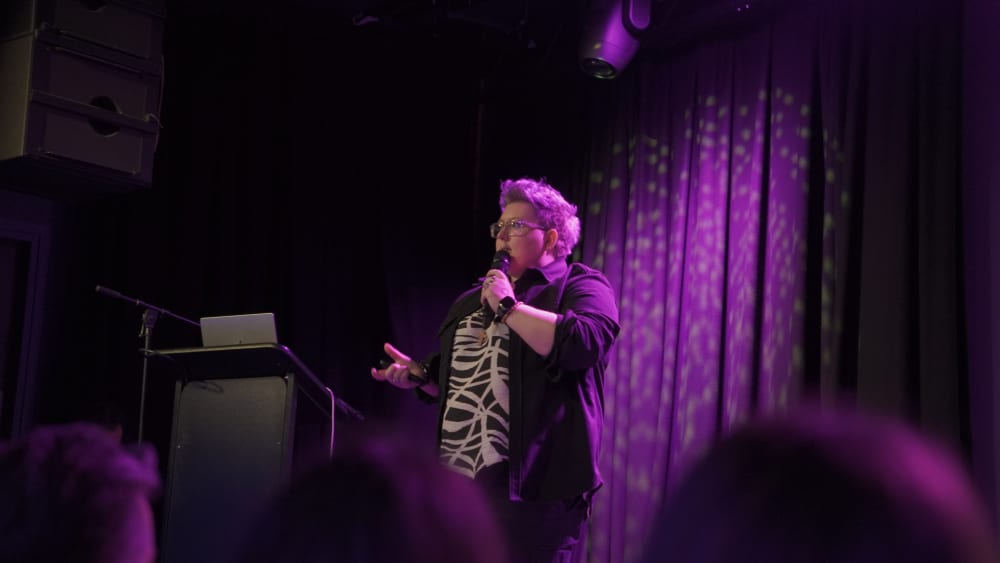
Tell us about your business idea, and what inspired it.
Abi: As a disabled individual, and one who had truly fought for their life at times, I knew exactly what I wanted to explore: how do we change social modelling, using service design to rebuild communities to be accessible and inclusive?
For 2 years, I ran a social enterprise which was embedded in East Surrey predominantly, making effective change in community health and development. But as time went on, the scope became broader and broader and I wanted to get back to what mattered to me – improving the disability experience.
As somebody who was passionate about research, policy and service design, as well as real community work, I developed the concept of Accessify UK: The Think Tank for Accessible Living. Accessify combines these areas of focus to work towards a simple goal: to build a world where disability is not an automatic factor for poor quality of life.
Eleanor: AllKin is a sensory fashion and lifestyle brand for people living with skin and sensory sensitivities. With lived experience, I was inspired and driven by a deep understanding and empathy for people living with these and associated conditions. I also wanted to address the inequalities surrounding this, particularly in how choices are made, and the impact this has on people’s daily lives. The venture will champion inclusivity across fashion and lifestyle to make comfort more accessible and desirable.
CERA: Our business idea is a passive air filtration system made from recycled ceramics as a retrofit solution in existing architecture. Our inspiration stemmed from a discussion about how heavy the air feels in the Underground train network. With a little bit of research, we found that close to 40% of the population of London uses the Underground system. We also discovered that the pollution levels in the network are worryingly high – spending just 20 minutes in the Underground is the equivalent of smoking an entire cigarette.
This issue has affected many residents of the city, but disproportionately more so when it comes to infants and young children, the elderly, people with pre-existing conditions. It’s especially damaging to train staff, leading to high levels of exposure in train engineers and network inspectors.
With all this information in hand, we could start looking at solutions to this problem, which could then be applied to enclosed environments with pollutants and particulate matter all around the world.
Hayley: My business idea was inspired by my aunty who is in her 50s and was struggling to navigate social media with confidence – that’s why GoGX was created.
What challenges have you faced in launching your business?
Abi: Setting up an organisation which is dedicated to improving the lives of a group of people is not easy. We are trying to change the world, and we can only do this in partnership with everybody else. We have accomplished this, and I absolutely love networking, but it isn’t always easy. Sharing your story constantly, trying to get those to understand the importance of this work, it can take it out of you.
Setting up a charitable organisation can be even harder. Finding trustees. Volunteers. Those dedicated to this mission aren't easy. We are always looking for more people, so please, anybody who's interested, we want to hear from you!
Eleanor: After the administration needed to set up any business venture, one of the biggest (ongoing) challenges I discovered, was research and sourcing funding. Competition is fierce and applications can have comprehensive requirements. It is very time-consuming! AllKin is looking for a backer to create its new collection, so if there are any interested investors, please get in touch!
CERA: As designers, one of the facets that has been a learning opportunity is the business aspects of creative ventures and the processes that go into them. Understanding the financial aspects, cash flows, funding and scaling has been a learning experience and has posed challenges to us over our time developing our offering.
We are always open to partners who have access to the facilities and opportunities that would help us take major steps forward in building our pilot project. This would also help us prove our concept in a practical setting and help give confidence for further partners who we can collaborate with on a much larger scale.
Hayley: For a while, we struggled to find affordable professional rental spaces for our workshops. Thankfully we were able to host our first successful pilot event at LCC this July where we got a lot of feedback and returning clients.
How did you first hear about the LCC Accelerate initiative, and why did you decide to take part?
Abi: I had known people who had gone through the Accelerator programme the year before me and had seen their amazing success from doing so. I was at a time in my life where I wanted to make this big change within my practice, but finding the time and expertise is difficult, especially when you’re practically working all the time. Joining the Accelerate programme meant that I could dedicate one day a week completely to developing Accessify into what I wanted and knew it could be. Accelerate gave me time, and access to so many professionals.
Eleanor: I saw the advert in the alumni newsletter. It arrived at a fortuitous moment - I was seeking a way to use my creativity for positivity and make life better. I had become increasingly aware of others with similar challenges and Accelerate appeared as a catalytic opportunity. I was thrilled with the panels’ comments and their enthusiasm for AllKin and couldn't wait to get started!
CERA: As we were finalising our pitch for the Creative Hack, we were quite invested in our solution and we decided to go forward with our innovation. In the process of building around the solution, we reached out to our network at UAL for support, advice, and guidance in building a full practice out of our idea.
We got very supportive responses from Adam Ramejkis and from the LCC Graduates team, Luminita Molico, Catherine Le Lievre and Steven Taylor. They told us about the LCC Accelerate program, which aims to help graduates with their entrepreneurial ideas. They invited and encouraged us to join in the programme as students to learn more about entrepreneurship and the process of starting and sustaining a creative business. Given that we were aiming to build our own entrepreneurial venture, it was a great way forward and led to us learning about and building on many facets of our venture.
Hayley: I first heard about the LCC Accelerate initiative via email. I decided to take part because I always had an entrepreneurial mindset and wanted to take advantage of the business resources LCC was offering.
What kind of activities did you take part in through the programme?
Abi: Each week we were met with another professional and every profession was fantastic. From writing funding applications to business plans, understanding sustainability, networking and so much more. We also were given access to a business mentor and mine was nothing short of fantastic – we’re still in contact today!
The instrumental activity I took part in was the University of Arts Pitch It Awards. This wasn’t a part of the Accelerator, but I’d never have heard about it otherwise – nor would I have had the support to apply. The Pitch It Awards was an initiative that was a little like Dragon’s Den. We had 3 minutes to pitch our business idea and the winners would be awarded £2,000 funding. I was honoured and humbled to win this award!
Eleanor: There were group, partner and individual activities on the programme. The most valuable exercises (for me) revolved around pitching. There were several opportunities across the course to practice, using different formats/pitch lengths and presenting to different group sizes (e.g. 30-second headlines and pitch-deck presentations). Each iteration was a step towards refining AllKins’ ‘why’ – bringing the pitch along further.
CERA: As part of the program, there were multiple sessions aimed at different parts of business, guest lectures and workshops, some of which were: Business Models and Value Proposition; Understanding customers; Customer Journey Mapping; Business and Financial Planning; Brand Building and Marketing; How to Pitch in front of potential clients; Grant writing to secure funds; Addressing Real Problems and Integrating Values.
Hayley: I took part in the Pitch-IT programme where GoGX won 3rd place in the ‘Ones to Watch’ category! There was also Pizza Leaving day where we all got to bond about our experiences together.
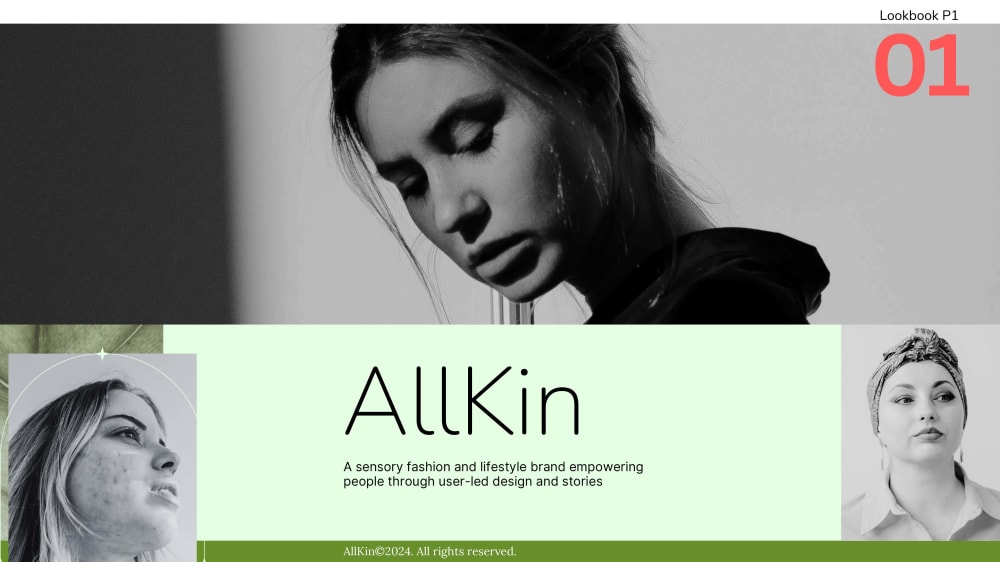
What were your highlights of the experience?
Abi: Every day we took part, in all honesty. What was a brilliant opportunity was to share the room and the space with 10-15 other business start-ups, looking at how we could all work and connect with each other. You don’t get other opportunities like this.
Eleanor: A range of fantastic presenters/practitioners kindly came into sessions and shared their wisdom and insights. It was wonderful to have the opportunity to speak with them on such a broad variety of topics. Another highlight was pitching to the judges in the Pitch-it competition - and coming 3rd was a real boost for AllKin. I was hugely grateful to meet/chat with expert judges and mentors along the way, to address some of my (many) questions! The course leaders were also tremendously enthusiastic and supportive.
CERA: The biggest highlight of the experience was the understanding of the role we play in the industry through our product innovation. Making our solution to help the residents of a city experience their lives without concerns of health issues caused by airborne pollutants is our biggest driving factor.
Another invaluable result of the experience is having Patrick Morris, who is a professional designer, a ceramicist and an entrepreneur himself, as our business mentor. A special mention to Andrew Tollinton, who taught us how to pitch our business idea in front of our clients and has continued to support us in building strong language and confidence.
Hayley: My highlights of the experience were meeting like-minded business colleagues and having an assigned personal mentor that guided us for 4 private sessions during the last few months.
How has Accelerate helped you to grow as an entrepreneur?
Abi: I came to Accelerate with vast experience, but that experience didn’t translate into how to set up a business. The financials, the business plans, all the little things that you don’t learn about at university. Having access to this, has allowed me to grow and develop Accessify into what it is now, and we are just over a month away from our official launch!
Eleanor: Pitch-it was an incredible opportunity that helped me identify and think more granularly about the target audience, key-messages, and the overarching presentation of AllKin’s vision. I also learned more about the reality of running an enterprise. This has given me much food for thought around partnering/finding a co-founder and the benefits/pitfalls of this.
CERA: LCC Accelerate helped us see the facets of an entrepreneurial venture that surrounds and builds a design offering. It also alluded to the journey that we must take as founders to achieve the goals that we have set out for ourselves,creating a business that builds value for users and can be sustained for years to come. It altered our way of thinking when initiating a project and makes us think ahead with a business mindset, with a vision of the full system.
Hayley: The Accelerate programme has helped me to grow into an entrepreneur in many ways, such as it being a big reality check which made me realise that having your own business is a lot harder than it seems and finances take a lot of time!
What was the most important lesson you learned from the initiative?
Abi: Hard question, as every lesson was super important. Overall, I think what is most important is how to manage business development, to not overstress, none of us know everything. But honestly, the entire process enabled us to leave as well-rounded entrepreneurs.
Eleanor: Keep on testing with your audience and be prepared for an idea to evolve quickly or change in a way you did not expect.
CERA: As designers, our work would heavily revolve around the solution itself and our process would heavily concentrate on it. Through the programme, we were exposed to the other parts of running a creative business and the importance that they hold in the entrepreneurial journey and in sustaining a business. We could come up with as many solutions as we could ever conceive, but without business knowledge, we would not be able to keep them in the world.
Some that were specifically important to us were: brand building and marketing; business models and value proposition; business and financial planning; pitching to clients and partners; integrating values; grant writing
Hayley: The most important lesson I learned from the initiative was to not focus on the end goal but to enjoy the journey and the opportunities that come.
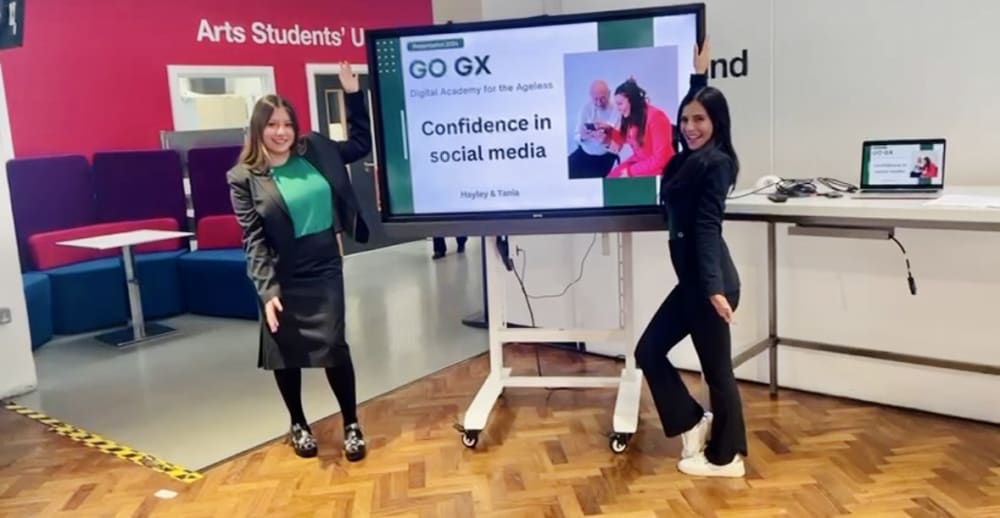
What are your future plans?
Abi: This may sound quite big, but I want to change the disabled experience for the better; not just in the small area I currently work in, but across the country and beyond. I want Accessify to grow into a national initiative, taking on nationwide research and makes the changes necessary to ensure every disabled individual has a good quality of life, achieving everything they want to do. I have started this in many ways. From joining Disability Research Groups, to Chairing Disability Advisory Networks with Surrey Police, my work is dedicated to this cause.
Eleanor: I am currently prototyping circular fashion ideas. Other priorities include launching AllKin’s capsule collection alongside developing a prototype interface.
CERA: We are currently in the process of material research and physical design while working on writing for grants. This is so we can secure funding for the prototyping and development of our air filtration systems. We’re also looking at alternate applications and use cases of our solution to sustain a diversified offering.
Once we’re satisfied with the performance of the system, we intend to reach out to clients, collaborate, and further expand and integrate them into large-scale networks to help tackle public health concerns. Someday, we hope to offer these systems globally.
Hayley: My future plans are to save up money from my freelance work to rent a space or work on getting collaborations from the council or other big organisations.
What advice would you give to other students who might be considering launching their own creative businesses?
Abi: If you’re considering launching your own creative business, the first question I’d ask you is: why? Why do you want to launch your own business rather than work within a company? Starting up a business means giving days and nights to it. It isn’t easy. Don’t set up a business because you want to be known as a founder or director too quickly. Set up a business because that is what drives you. Whether it is establishing your own product, presenting your own artwork to the world, or changing the world. Find your reason first for doing it – once you have the purpose, whatever is thrown your way, you can manage, no matter how hard it may seem.
The second bit of advice I would give is network, network, network. Nobody can set up a successful business on their own. That doesn’t mean giving away intellectual property or percentages of your business, it means becoming known in the industry you’re going into. Reach out to those already established. Yes, you may get some rejections along the way, but that says more about them than you. The power is in people. So harness it. Ask questions. Go to events. Make yourself known. Be loud!
Eleanor: Be prepared to invest time and money in non-creative things, including research and administration - e.g. gaining audience insights, marketing plans, registering the company and its trademarks (if required), and finding funding. Keep asking ẃhy' - and listen to the experts!
CERA: As we give this advice, we are currently working on them ourselves. Time management is important, not to mention cultivating a strong mindset. Growing a business idea is challenging, but it’s also a massive learning opportunity. On top of that, be consistent, resilient and try to create a democracy within the working team.
Participating in and attending events with other designers, entrepreneurs, and business leaders will teach you a lot more than you realise and will help you build a network of people who will help you succeed in your goals and will push you to achieve your dreams.
Hayley: Be patient; know that results will not come instantly, but you just have to be resilient and carry on. Never lose sight of what’s really important (your creative practice) – carry on doing what you love, even if you can’t always make money out of it!
Are you an LCC graduate? Whether you're currently running your own business, or looking for support to set one up, we want to hear from you.
Contact the LCC Graduate Futures team for further information on how you can join our community of innovators and take the next step on your entrepreneurial journey: graduates@lcc.arts.ac.uk
Related links
- Learn more about LCC Accelerate.
- Discover AllKin, Accessify and GoGX.
- Read about Victoria Monari, one of the entrepreneurs from Accelerate 2023.
- Explore the work of the LCC Graduate Futures team.